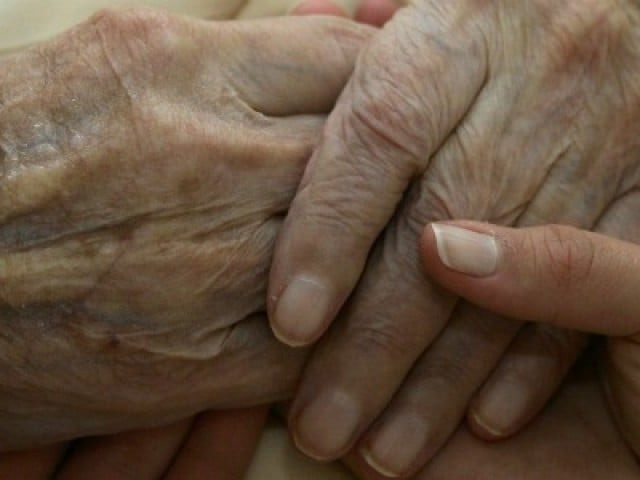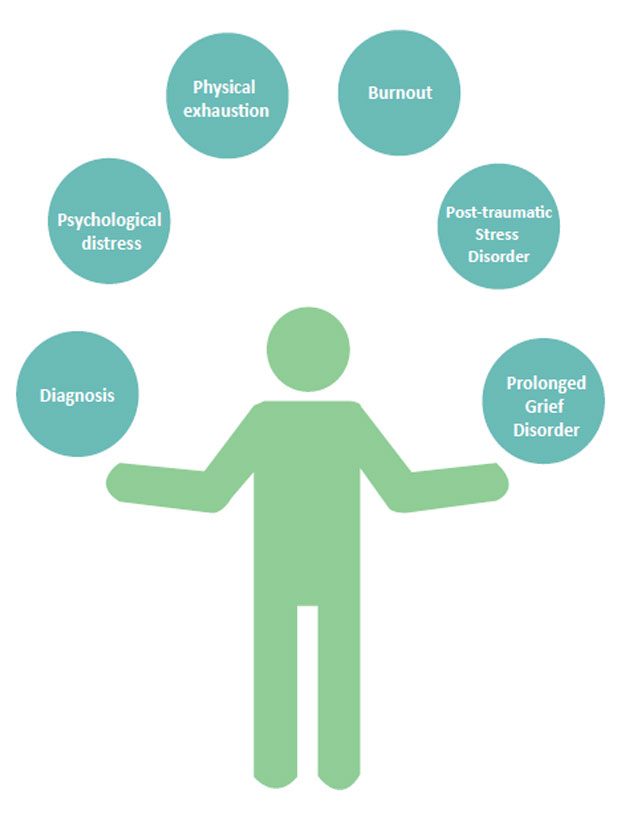Can we care for the caregivers?
Because for some caregivers, the anxiety lingers long after their loved ones pass away

Because for some caregivers, the anxiety lingers long after their loved ones pass away. PHOTO: FILE
For some caregivers, the anxiety lingers long after their loved ones pass away. 23-year-old Sana seems to suffer a form of post-traumatic stress after her mother’s final illness. She struggles with intrusive thoughts and memories as she tries to fall asleep every night. When she closes her eyes, the images are more vivid than she can bear. Her breathing gets faster and heavier as she attempts to fight off the flashbacks. She stares out into space and wrestles with intense emotions inside. She feels powerless, angry, ashamed and guilty.
Less attention has been given to the illness’s emotional impact on caregivers. From the shock of the cancer diagnosis to its painful prognosis, depression and anxiety take a toll on patients and family caregivers. Yasra Hayat, a clinical psychologist, often sees caregivers unable to stop reliving their painful memories. “The suffering is so powerfully seared into their brains that it becomes impossible for them to push it away,” she says.
Flashbacks are a common symptom of Post-traumatic stress disorder (PTSD), coupled with anxiety, depression, guilt, apathy, and much more. External manifestations of a flashback include panicking, hysterical sobbing, flailing around and self-harming. But, on the inside, the symptoms vary and are unique to the individual and their experiences.
“It’s like a little piece of your consciousness breaks apart during a traumatic event. When a flashback gets triggered, you become that piece,” Sana says apologetically. “You are in the middle of a living nightmare. You feel helpless and fragile, and a part of you just snaps off. You are no longer connected to your rational mind. The wounded pieces of you are just hanging there in your past.”
For all her mental confusion, Sana can now differentiate between the emotional wounds she suffered – guilt, night terrors, and anxiety – and the more concrete physical symptoms that she traces to the intense shock of her mother’s death. She developed a form of stomach problem that the medical team was unable to identify for months. “The pain was dismissed by saying “it’s all in my head.” Pain and worry created a cycle that was hard to break,” she says.
Sana is one of the many caregivers in Pakistan who looks after a parent, grandparent, spouse or relative, at the expense of her own emotional needs. Oftentimes, they carry out these tasks while working, studying or parenting. The physical and mental toll of caregiving leaves an indelible mark on their lives, even after the caregiving ends.
The American Psychiatric Association, in the Diagnostic and Statistical Manual (DSM- V) of Mental Disorders, includes “persistent complex bereavement-related disorder” in its fifth edition, published in 2013. The manual sets 12 months as the point beyond which the symptoms of grief and loss may classify as a disorder.
Sarah, a journalist and college professor, was exceptionally close to her mother and long dreaded saying a final goodbye. During the course of her mother’s treatment for stage four pancreatic cancer, Sarah remained irritable, anxious, tensed and desperately hoped for a miracle. Three years after her mother’s death, she still found herself grappling with an altered sense of identity.
She faced several twists and turns along the way and felt sadness and regret over what had happened. Profound grief descended on her for more than a year, coupled with flashes of guilt. “For a long time I thought I should have done something to control the uncontrollable,” she says.
The loss of a loved one often brings feelings of intense grief and sadness to the caregiver. However, with time, those feelings begin to fade and people try to rediscover life’s pleasures in daily activities. Elisabeth Kubler Ross, a Swiss psychiatrist, posited a “stage theory” of grief in 2005. She suggested that family caregivers go through five stages of grief: denial, anger, bargaining, depression, and acceptance. However, new research has proved that grief, like any other emotion, doesn’t follow a check-list. It’s a complicated process which varies from individual to individual.
 ILLUSTRATION: HINA JAVED
ILLUSTRATION: HINA JAVEDWhat distinguished Sarah’s suffering was its sheer duration and aggravating symptoms. She remained mired in grief and anxiety for three years until she finally decided to opt for therapy.
Along with therapy, Sarah found immense consolation in praying for her mother’s afterlife. “Even when she was suffering, I always longed for heavenly hope,” she adds. Faith became a refuge from her feelings of guilt and doubt, along with her insight that this too had a purpose in her life. According to Hayat, therapy focuses on what works for a patient. “If the patient is inclined towards religion, it can play a huge role in their emotional healing,” she adds.
Interventions focused on improving end of life experiences of patients with advanced cancer play a huge role in post-loss bereavement adjustment for caregivers. More often than not, the emotional disconnect between patients and doctors proves counterproductive to the patient’s recovery and caregiver’s mental health. The medical and paramedical staff is blunt about their daily reality. Doctors’ empathy wanes as they routinely see patients on rotation. “Because of the nature of the medical profession, we feel like technicians working on an assembly line,” says Samreena Imran, head nurse of oncology and radiation unit at Agha Khan University Hospital (AKUH). “The nature of our job is such that it ignores the emotional side of human distress. The organizational chaos makes us emotionally distant.”
To Sana, the initial shock came when the doctor broke the news of her mother’s illness to the family. “The medical team was shamefully apathetic to the fate of my mother’s illness. They gave her a death sentence of sorts,” she says regretfully.
To tell a patient they are terminal is a question doctors must continually tackle. While the medical staff believes it is their right to inform the patient, caregivers are of the view that it negatively impacts the patient’s willpower. According to Dr. Muneera Moosajee, oncologist at AKUH, doctors should not blur the truth by breaking the news in euphemisms. She believes that patients should know how ill they are. “Hiding the illness runs counter to humanity. We owe this explanation to our patients.”
As a daughter of a patient, Sana was startled by the corrosive doctor-patient relationship. “I always sensed hostility in the medical team. They were brusque and emotionally detached,” she says. After her mother’s diagnosis, Sana had woken up to a world that seemed utterly inconsistent to patient’s needs. The forced wakings and routine medical procedures became painstaking for her mother. The hourly check-ins were often futile. The beeping monitors became a constant source of anxiety. “I would run to every nook and cranny to get hold of the paramedical staff and they would curtly tell me to be prepared for her death.”
Clinical empathy is an essential but often overlooked skill in the medical profession. Dr. Moosajee believes the reason why some doctors try not to respond with empathy is because they fear unleashing a flood of emotions in the patient and themselves. While the medical profession trains individuals to emotionally distance themselves from patients, studies have linked clinical empathy to greater patient satisfaction. The Society for General Internal Medicine defines empathy as the act of acknowledging human emotion without experiencing that state oneself.
Among the important lessons Dr. Moosajee learnt as a practicing oncologist in the United States of America (USA) was to inform the patient and the family of the course of the illness and treatment. “There is a particular way to break the news to the patient and caregivers,” she says. “When delivering bad news, doctors should figure out the best way to address patients’ concerns, pay attention to their tone of voice and schedule them for the end of the day to deal with unexpected reactions from family members.”
Another phenomenon that is often overlooked by healthcare professionals is caregiver burnout. The symptoms include disturbances in sleep cycle, weight gain or loss, weak immune system and clinical depression.
26-year-old Soha has been caring for her mother, stage II breast cancer patient, for the past three years. When she dashes out for work, she constantly checks in by phone with the aides she has hired. “I am always paranoid at work. I am thinking, ‘is mom okay?’”
Though caregiving is a profound and fulfilling journey for the vast majority, the healthcare system turns a blind eye to their needs. Having counseling, support services, and respite programs could temporarily relieve them from the burdens of caregiving. Mental health professionals, like Hayat, are of the view that in order to care for the patients, the caregivers should first tend to their own needs.
“Recovery is possible with treatment, although a sense of loss may never disappear completely,” says Hayat. “Our work focuses on unearthing the source of anxiety and facing the fears rather than avoiding them.” Once the conflict is identified, patients are taught various relaxation exercises and problem-solving techniques which can help them deal with their triggers. Moreover, channeling negative emotions associated with caregiving into positive ones can also help restore a sense of emotional balance in the caregivers.
The current patient-centered care approach seems too narrow. While it recognizes that patients’ needs come first, it fails to acknowledge the fact that illness is a family affair.
*Names have been changed to conceal identity.
Hina Javed is an investigative journalist passionate about human rights reporting with a focus on gender, sexuality and health.



















COMMENTS
Comments are moderated and generally will be posted if they are on-topic and not abusive.
For more information, please see our Comments FAQ